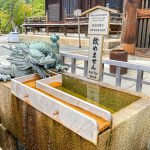With exchange rates, international charge fees, and money conversion, it can be very confusing to know what the best way to pay for things in another country are. Japan is very much still a cash society and you are expected to pay in cash most of the time, but you still have options. Here are a few things to help you be more prepared:
-You will want to arrive with a sufficient amount of Yen to help you get through the first couple days, so you aren’t scrambling to get Yen. You can easily find a company online that does foreign currency exchange transactions (I would recommend using bigger names like banks that you are familiar with), and compare the exchange rate and fees with a couple companies before you settle on one to get the best deal. You can usually also work with your personal bank to get Yen ordered.
-We strongly recommend to NEVER exchange your money at the airport. Typically their fees are much higher, and you will lose more money doing it this way.
-Travelers Checks – This was my personal favorite method while in Japan. I was able to get these checks from my bank before we left for Japan, and it was very easy to convert them at the Post Office or Money Exchange office in Japan on our breaks (you can also often exchange them at larger western-style hotels and big department stores). The only downside to this is you may have to wait in line, and could take a bit more time than your quick ATM. And even though Japan is a very safe country, it is always safest to carry around the bulk of your money in travelers checks. When you get your travelers checks outside of Japan, you should get the checks in your native currency, not in Japanese Yen (otherwise you will have to pay a higher exchange rate).
– Cash – You can bring cash in your native foreign currencies. Once again, you will have to wait in line. This doesn’t make sense, but you will get a better exchange rate with travelers checks than you will cash.
-ATMs – Most bank ATMs only accept Japanese issued cards, however you can use the ATMs at Post Office or 7-11 Convenience stores (both of which are located everywhere!) since these particular ATMs are linked to the international Cirrus and Plus cash networks (as well as some credit card networks including Visa, MasterCard and American Express). You can get slightly better exchange rates at ATMs compared to banks. Please note there may be a maximum withdrawal limit per transaction/day. Make sure your bank knows that you are traveling internationally before you leave, so they do not put a hold on your card. It is also good to check on any restrictions they may have on your account regarding foreign transactions. Also, make sure your pin number is numeric only, as the ATMs will not allow letters. You will also want to make sure you understand what international fees will apply to avoid any unpleasant surprises.
-Credit Cards – Credit and debit cards are far more widely accepted in Japan than they were a few years ago. The most useful cards to carry are Visa and American Express, followed closely by MasterCard, then Diners Club. Even though credit cards are not widely accepted in Japan, it is still worthwhile to bring at least one for those places that do accept credit cards. You will get a better exchange rate with a credit card than at a bank. Again, you will want to check with your company to see if there are any restrictions, and what fees they may charge when using your card, and let them know you will be traveling internationally.
So in a nutshell, bring some Yen with you, let your banks/credit card companies know that you will be traveling internationally, and bring some travelers checks with you. (Oh yea, and enjoy traveling, sightseeing, shopping, and dining in Japan!)





